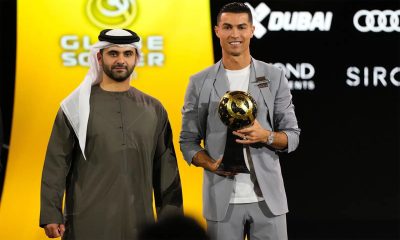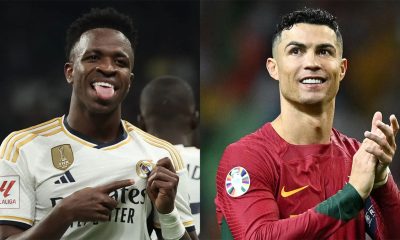Sports
How Ronaldo’s brilliance left 5 great Brazilian strikers in the shadows
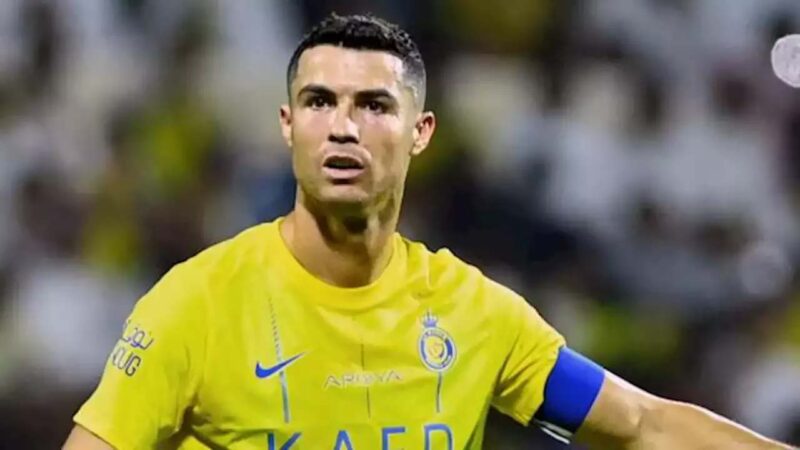
How Ronaldo’s brilliance left 5 great Brazilian strikers in the shadows
In the decade that followed Brazil’s 1994 World Cup triumph, the Selecao boasted an unparalleled plethora of attacking talents, yet none shone as brightly as Ronaldo.
O Fenomeno was in a class of his own; a dizzying mix of speed, dribbling, feints and clinical finishing that put him among the beautiful game’s very best.
While he excelled for PSV Eindhoven, Barcelona and Inter Milan and Real Madrid, the fondest memories of Ronaldo are usually tinged in the familiar yellow of Brazil.
World Cup and Copa America titles, along with countless other individual accolades, put him up there with Pele as a Selecao icon.
For some, living alongside that kind greatness came easy – the likes of Romario, Bebeto, Rivaldo, Edmundo and Ronaldinho all shone alongside O Fenomeno.
It’s the players who never got to share the spotlight being celebrated here. World-class talents left forever waiting in the wings for Brazil, born a decade too early and condemned to an international legacy unbefitting of their incredible talents.
Giovane Elber
In 10 seasons – three with Stuttgart and seven at Bayern Munich – Giovane Elber carved out a reputation as one of the Bundesliga’s greatest marksmen.
Elber was a different kind of striker to Ronaldo but no less worthy; a forward equally adept at linking the play and finishing off attacking moves. A heady mix of Brazilian flair and German work ethic.
Brought to Europe by AC Milan, Elber left the Rossoneri without playing for the first team, going on to enjoy prolific spells with Grasshopper Zurich and Stuttgart.
READ ALSO:
- 3 teenagers remanded in prison for causing disturbance around Wike’s house
-
Airport worker caught swallowing $300 stolen from passenger’s wallet + VIDEO
-
Obasanjo is Nigeria’s real problem – Estranged wife
His best years came at Bayern, though, with the Brazilian contributing to a period of success that included four Bundesliga titles, three German Cups and the Champions League.
Club top scorer in six of his seven seasons at Bayern, Elber’s 133 goals in 260 appearances made him the Bundesliga’s all-time top foreign goalscorer until Claudio Pizarro took his crown.
Yet throughout this time, Elber remained on the fringes of the Brazil national team. Like Ronaldo, Elber was a teen prodigy, emerging from the 1991 FIFA World Youth Championship, in which he scored four goals in six matches.
But in spite of this and his subsequent form in Germany, he had to wait until 1998 for a first senior call-up. His absence has long been attributed to his decision to play in Germany, with Brazil managers favouring players abroad drawn from Italy or Spain.
When he did get a chance, it came with a caveat: Luiz Felipe Scolari offered Elber the opportunity to replace the injured Ronaldo in Brazil’s squad for the 2001 Copa America in Colombia. Amid security concerns that had already seen Argentina withdraw entirely, Elber declined. Scolari refused to pick him again, ending any hopes he had of making the 2002 finals.
“The subject is closed,” Elber upon announcing his international retirement. “When the 2006 World Cup comes around, I will be 33 and I will not have the desire or the ability to play.”
He finished with seven goals in 15 games for Brazil.
Mario Jardel
One of Europe’s leading strikers in the late 1990s and early 2000s, the spectre of Ronaldo loomed large over Mario Jardel’s career.
Often inaccurately viewed as an out-and-out poacher, Jardel’s goalscoring repertoire was arguably more varied than even O Fenomeno’s. An exemplary finisher in the box, he was equally comfortable shooting from distance, while his bullet headers became something of a trademark.
Jardel also scored goals by the bucketload – 30 or more in each of his first six seasons in Europe – starting at Porto where he scored 166 goals in 169 appearances from 1997 to 2000. But it could have been even better.
READ ALSO:
-
I don’t know why Mohbad joined Naira Marley, he passed NECO at one sitting – Ex-principal
-
BREAKING: NLC begins nationwide strike indefinitely
-
Presidency retracts claims; says Tinubu not first African leader to ring closing bell at NASDAQ
Linked with the likes of Inter Milan and Barcelona, Jardel never got the chance to follow in Ronaldo’s footsteps at either, twice snubbed and instead signed by Galatasaray and, a year later, Sporting Lisbon.
Jardel scored 34 times for Gala during a single-season stay before moving on to Sporting in 2001, where he fired the club to a first league title in almost 20 years, scoring 42 goals in 30 league games.
That should have been enough to see Jardel at the 2002 World Cup – particularly as Ronaldo managed just seven goals in 16 that season – but his card had already been marked by Scolari.
In the summer of 2001, Jardel accepted the invite turned down by Elber to play for Brazil in place of Ronaldo at the Copa America in Colombia. He endured a torrid time, failing to score as Brazil exited in the quarter-finals to Honduras, confirming Scolari’s belief his stats were inflated in the process.
Omitted from the 2002 squad in favour of lesser names happy to warm the bench while Ronaldo starred, Jardel’s career never recovered. He left Sporting a year later, embarking on an increasingly nomadic career as a pale, bloated imitation of his former self.
Sonny Anderson
How do you replace a player like Ronaldo? For Barcelona, the answer was Sonny Anderson. Or at least, that was how the fans and press saw it.
Anderson had spent three years in France prior to his arrival at Barcelona in 1997. An initial six-month spell with Marseille brought 16 goals in 20 games but it was AS Monaco that the Brazilian truly carved out his reputation, scoring 64 times in 112 games for the Principality club.
The Brazilian was so much more than a goalscorer though. “He could finish with his left and right. Hold the ball up, win it in the air and play passes. He could do the lot. And he did it at lightning pace,” his Monaco team-mate, John Collins, told the BBC.
A league title winner with Monaco in 1997, Anderson was also Ligue 1 Player of the Year and the breakout star in a team featuring Emmanuel Petit, Thierry Henry, and David Trezeguet. That was enough to see Barcelona fork out €17million for his services, but supporters were unconvinced.
READ ALSO:
-
Kaduna refinery gives host communities lots of job slots – MD
-
Olayemi Cardoso, new CBN gov assumes duty as embattled Emefiele resigns
-
17-year-old student commits suicide in Makurdi— Police
“It was a very difficult time because when I arrived, I cost more money than Ronaldo and the fans expected from me a similar performance,” Anderson told Goal.
“Ronaldo was a unique player and the fans didn’t know much about me because I played in France.”
Despite scoring 10 times in La Liga during a double-winning debut campaign Louis van Gaal, the Ronaldo comparisons continued, especially as O Fenomeno bagged 25 for Inter that same season.
Though another title followed, it wasn’t long before Anderson was on his way back to France with Lyon, having become fed up with life under Van Gaal at a club where he was forever in the shadow of another Brazilian who wasn’t even there.
It was a move that curtailed any hopes of an international career. One that amounted to just six caps and, in truth, only began in August 1997 – around the time Anderson was being dubbed Ronaldo’s replacement.
Marcio Amoroso
Tipped to reach the same heights at Ronaldo in his younger years, at one point Amoroso looked on course to do exactly that – only for fate to intervene.
Having impressed in his homeland with Guarani, the Brazilian arrived in Italy in 1997, a year prior to Ronaldo, and quickly set about showing why he was one of Brazil’s most highly-rated youngsters at the time with Udinese.
The 22-year-old Amoroso defied his age to bag 12 goals in the ultra-defensive Serie A. An intelligent, skilful attacker capable of playing as a traditional number nine or 10, Brazil manager Mario Zagallo was among Amoroso’s many admirers and may well have taken him to the 1998 World Cup had he not been injured.
A year later, a fully-fit Amoroso was up and running and, most significantly, outscoring Ronaldo in Serie A, with a return of 22 goals making him the division’s top scorer for the 1998-99 campaign, eight ahead of O Fenomeno.
Picked as part of Vanderlei Luxemburgo’s Brazil squad for the 1999 Copa America, Amoroso shone again, scoring four goals en route to the title, including the opener in Brazil’s 2-1 semi-final win over Mexico.
Part of an attacking quartet that included Rivaldo, Ronaldinho and Ronaldo, he even won praise from the latter, who described him as “an animal” and “great to play with”. He could do no wrong.
It certainly seemed like that over the course of the 2001-02 campaign, with Amoroso making a flying start to life at new club Borussia Dortmund, following a £20million move, with a tally of 26 goals in 46 games helping the club win the Bundesliga. Amoroso finished as the top scorer in the process.
READ ALSO:
-
NFF seeks support for Osimhen’s Ballon D’or bid
-
Pastor arrested for allegedly killing girl in Delta community
-
Troops rescue 6 abducted Gusau varsity female students
Yet as the 2002 World Cup approached, a change of managers saw Amoroso out in the cold under Scolari. The Brazilian coach was unimpressed with European leagues outside of Italy or Spain and wasn’t one for changing his mind – even when Amoroso, fresh from scoring three times against AC MIlan in the UEFA Cup that season, told reporters: “The hat-trick is a message to Scolari.”
Omitted from the 23-man list, Amoroso’s later career was blighted by injury in an away similar to that of Ronaldo. But while O Fenomeno’s knack for timing saw him return at key moments for Brazil, his Copa America compatriot was less lucky.
Had Brazil lost the 2002 World Cup, then more may have been made of his omission. But, as the saying goes, history is written by the victors.
Giovanni
A precursor to Neymar among Santos fans, Giovanni Silva de Oliveira was handed the nickname “Messiah” among fans of the Brazilian club after a return of 37 goals in 36 games over two years.
Giovanni came up against a higher power when he joined Barcelona in 1996 though. Signed to primarily play as an attacking midfielder, he was equally effective in front of goal.
Classy, creative and boasting impressive technique on the ball, Giovanni might have stolen the show in that first season were it not for Ronaldo’s arrival.
Instead, he had to make do playing second fiddle as Barcelona’s second most exciting Brazilian prospect. There were occasional highlights along the way, with Giovanni scoring home and away against Red Star Belgrade in the European Cup Winners’ Cup and netting the winner against Real Madrid in the Copa Del Rey.
But Giovanni cut an increasingly peripheral figure as the season went on, used sparingly by Bobby Robson and forced to watch on as Ronaldo went from strength to strength. He scored 12 times in all competitions but was an unused sub in the European Cup Winners’ Cup final, watching on as you-know-who scored the winner.
With Robson moving upstairs and Ronaldo moving to Inter that summer, Giovanni must have thought he finally had a chance at living up to his Santos reputation. But he didn’t count on the disciplinarian approach of the incoming Louis van Gaal, a manager he claimed was “a Hitler for Brazilians”.
“He is arrogant, haughty and has a mental problem,” he told Folha. “He did not want Brazilians around him.
“He always said that we were not training well. Van Gaal has no idea of football and always comes with the same training sessions. He seems crazy.”
Giovanni soon departed for Olympiakos, where his all-action displays earned him the nickname The Wizard. But despite a fine career in Greece that included five league titles and some impressive goals, his star soon faded in Brazil.
Part of the Selecao squad for the 1997 Copa America and 1998 World Cup, he made little impact at either tournament and was not selected again. Ronaldo did considerably better.
He may have despised Van Gaal but part of The Wizard must have wished he could magic away Ronaldo.
How Ronaldo’s brilliance left 5 great Brazilian strikers in the shadows
Planet Football
Sports
Liverpool leap closer to title with narrow Everton win
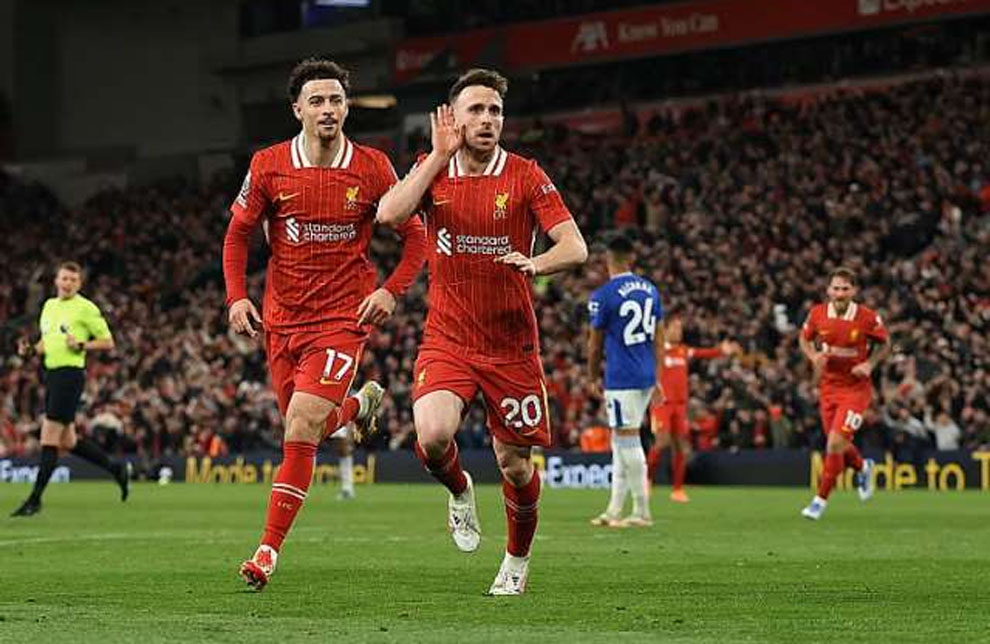
Liverpool leap closer to title with narrow Everton win
Liverpool claimed bragging rights on Merseyside with victory over rivals Everton and edged closer to lifting the Premier League title.
Arne Slot’s men require only 13 points from a possible 24 available to guarantee a deserved and record-equalling 20th top-flight triumph.
The Reds were being frustrated by Everton’s backline sitting deep, but claimed the three points courtesy of a moment of magic from Diogo Jota.
The Portuguese forward was on the periphery of the game but collected Luis Diaz’s cute backheel before showcasing dancing feet by jinking past challenges and slotting home.
Before the deadlock was broken, a moment of controversy was the main talking point with Everton defender James Tarkowski incredibly fortunate to stay on the pitch.
READ ALSO:
- Deadly strikes in Gaza as Netanyahu says Israel will seize new military corridor
- Wike congratulates Okpebholo on tribunal victory
- FG orders immediate reopening of independence bridge in Lagos to ease traffic
Tarkowski received only a yellow card early on when he won the ball with a sliding challenge but caught Alexis Mac Allister on the knee with his studs with the follow-through.
The video assistant referee (VAR) decided not to upgrade the tackle to a red card and Dominik Szoboszlai curled the resulting free-kick narrowly wide, while the in-form Mohamed Salah headed straight at Jordan Pickford at the back post.
Beto had the Liverpool backline rattled and saw a goal ruled out for offside after outmuscling Virgil van Dijk.
The striker got the better of the Reds captain again, but this time could only hit the post when one-on-one with Caoimhin Kelleher.
Liverpool and their supporters looked to up the ante in the second period and Ryan Gravenberch’s stinging drive from range was pushed away by Pickford, but Jota’s 56th-minute strike made the difference.
Liverpool leap closer to title with narrow Everton win
Sports
Ancelotti says mission accomplished as Real Madrid reach cup final
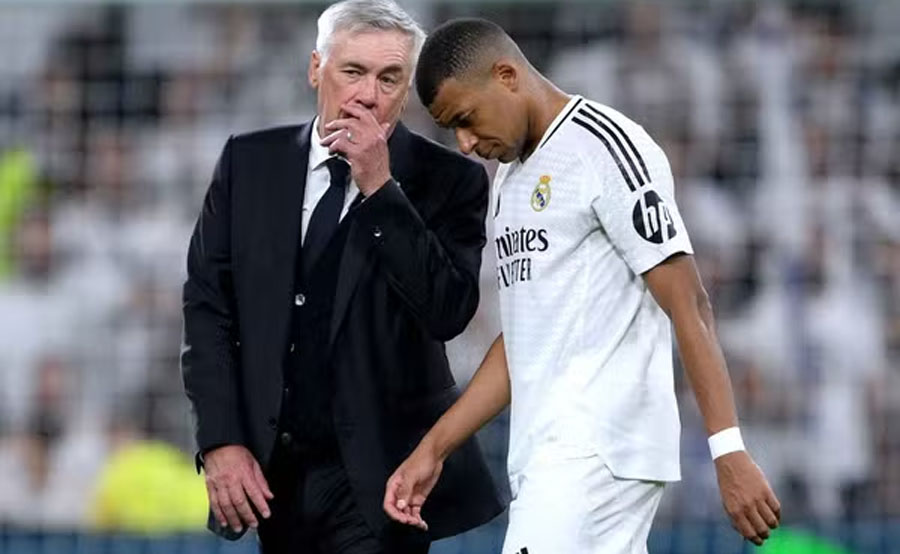
Ancelotti says mission accomplished as Real Madrid reach cup final
It was mission accomplished, said Real Madrid coach Carlo Ancelotti after his side fought back from two-goals behind to snatch a rip-roaring 4-4 draw on Tuesday for a 5-4 aggregate win that put them through against Real Sociedad to the Copa del Rey final.
Ancelotti brushed off questions about a sub-par performance by Real Madrid and praised his players’ effort in what he considered a highly entertaining encounter.
“We have achieved our goal today which was to reach the final and there is not much time to think about it,” Ancelotti told a press conference.
“It was an entertaining game with some mistakes and a lot of good things. It was fun and we are in the final.
READ ALSO:
- Rainstorm destroys schools, mosques, others in Kwara community
- Rivers police arrest General Overseer for alleged homosexuality
- CBN posts $23bn net FX reserve, strongest in three years
“I never saw ourselves out of it because anything can happen at the Bernabeu. When we have to come from behind, we never give up. We never give up, especially at home, with the fans by our side.”
Ancelotti said David Alaba was not to blame after he deflected two balls into his own goal, calling it “bad luck” by the Austrian defender, but urged his defence to play with better focus moving forward.
“It’s not good to concede four goals in a game,” Ancelotti said.
“Right now we are a team that has a lot of effectiveness up-front, but little balance.
“However, we can’t ignore what we did in attack, scoring four goals against Real is not that easy. I think we are doing quite well.”
Real Madrid, who have won the Spanish Cup only once in over a decade, will play either Barcelona or Atletico Madrid in a mouth-watering final in Seville next month.
Atletico fought back to hold Barca to a thrilling 4-4 draw ahead of Wednesday’s second-leg in Madrid.
Ancelotti says mission accomplished as Real Madrid reach cup final
Sports
Saka’s stunning return powers Arsenal to victory over Fulham
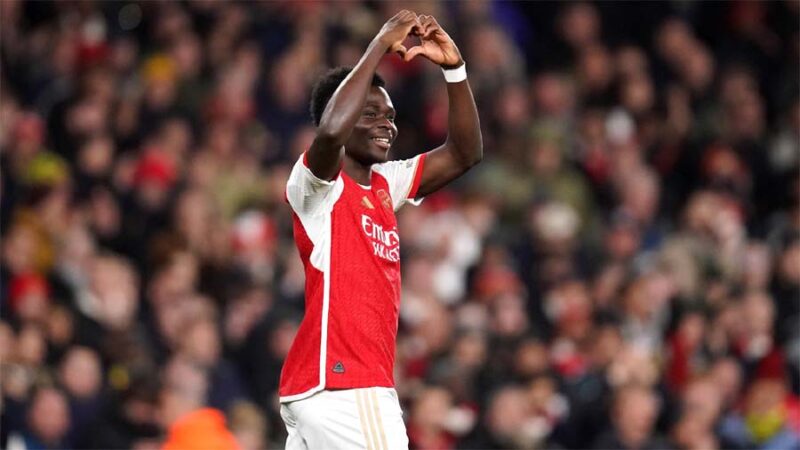
Saka’s stunning return powers Arsenal to victory over Fulham
Arsenal secured a crucial 2-1 victory over Fulham at the Emirates Stadium, with Bukayo Saka making a triumphant return from injury to score the decisive goal.
The match saw the Gunners dominate possession, but it was Fulham who came closest to scoring in the opening stages.
Arsenal struggled to break down their resolute defence early on, with Gabriel Martinelli having a goal ruled out for offside and several opportunities narrowly missed.
In the 37th minute, Mikel Merino gave Arsenal the lead, collecting a pass from Ethan Nwaneri to strike a low shot past Fulham goalkeeper Bernd Leno. The first half ended with Fulham unable to find an equaliser, despite a couple of dangerous moments.
READ ALSO:
- Nigerian Army opens online registration for new intakes
- Woman arrested for trafficking daughter for N50,000 to Mauritania
- Breaking: Tinubu sacks Kyari, appoints Ojulari as new NNPCL GCEO
The turning point came just after the hour mark when Arsenal doubled their advantage. Gabriel Martinelli delivered a perfect cross, and Saka, making his return to action, rose to head home a brilliant goal. The Gunners were cruising with a comfortable 2-0 lead.
However, Fulham responded on added time when Rodrigo Muniz capitalised on a deflected shot to pull one back for the visitors. Despite the late pressure, Arsenal’s defence held firm, and the match finished 2-1 in their favour.
Saka’s return was a key moment, not only for the goal but also for the confidence he brought to the team, sealing another vital three points for Arsenal in their quest for the title.
Saka’s stunning return powers Arsenal to victory over Fulham
-

 metro2 days ago
metro2 days agoBREAKING: Senator Natasha defies restrictions, arrives homecoming rally by helicopter [VIDEO]
-

 metro2 days ago
metro2 days agoUromi: Edo residents flee towns over likely reprisal attack, arrest
-

 metro2 days ago
metro2 days agoBreaking: ‘Cancel your homecoming’ — Police tell Senator Natasha
-

 metro2 days ago
metro2 days agoBreaking: Tinubu sacks Kyari, appoints Ojulari as new NNPCL GCEO
-
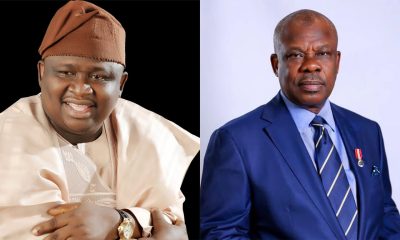
 metro2 days ago
metro2 days agoAmosun, Adeola engage in verbal attack over project diversion allegation
-

 Auto3 days ago
Auto3 days agoCFAO subsidiary LOXEA unveils BYD electric vehicles in Nigeria
-

 International12 hours ago
International12 hours agoTrump slams Nigeria with high tariff in shocking trade crackdown
-

 metro2 days ago
metro2 days agoKogi LG imposes curfew ahead of Natasha’s homecoming event



